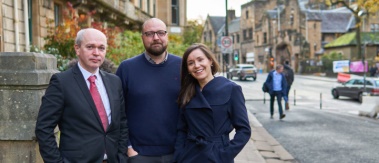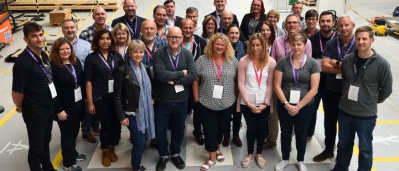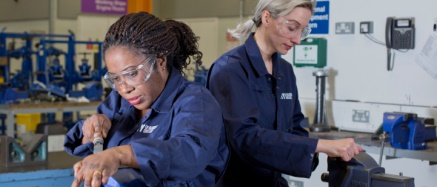SFC news published since 2018. See SFC archived content for earlier news articles.
2019 was a busy and varied year at the Scottish Funding Council. Here, month by month, is a selection of articles that highlight the diversity of our work. Alongside the expected – innovation, widening access and skills development – are stories that reflect some of the more surprising things we do.
 January – green energy: We began the year in which the Scottish Government would declare a climate emergency with a story about green energy. SFC-funded Interface matched Renewable Parts Ltd (RPL) with the University of Strathclyde. Their joint project focused on improving RPL’s ability to remanufacture components used in wind turbines – making the green energy industry even greener.
January – green energy: We began the year in which the Scottish Government would declare a climate emergency with a story about green energy. SFC-funded Interface matched Renewable Parts Ltd (RPL) with the University of Strathclyde. Their joint project focused on improving RPL’s ability to remanufacture components used in wind turbines – making the green energy industry even greener.
 February – sport: In February SFC-funded Scottish Students Sports announced the finalists of the 2019 Queen’s Park Shield. In all its 92 years this student football tournament had never been won by a college team and for the first time ever a college team had reached the final. SFC-funded Scottish Student Sports organises the tournament and invited My SFC to the big game a few weeks later when Edinburgh College won an historic victory over the University of Edinburgh.
February – sport: In February SFC-funded Scottish Students Sports announced the finalists of the 2019 Queen’s Park Shield. In all its 92 years this student football tournament had never been won by a college team and for the first time ever a college team had reached the final. SFC-funded Scottish Student Sports organises the tournament and invited My SFC to the big game a few weeks later when Edinburgh College won an historic victory over the University of Edinburgh.
 March – food: March saw the opening of a £1.6 million, SFC-funded animal disease surveillance centre. The centre is part of Scotland’s Rural College and is capable of analysing more than a million samples a year using robotics alongside human expertise. Its work will help to protect the food we eat by diagnosing animal disease more quickly and more reliably than was previously possible.
March – food: March saw the opening of a £1.6 million, SFC-funded animal disease surveillance centre. The centre is part of Scotland’s Rural College and is capable of analysing more than a million samples a year using robotics alongside human expertise. Its work will help to protect the food we eat by diagnosing animal disease more quickly and more reliably than was previously possible.
 April – Scotland’s digital future: EIT digital, a leading European organisation for digital innovation, arrived in Scotland thanks to a joint investment from SFC and Scottish Enterprise. Speaking at its launch at the University of Edinburgh’s Bayes Centre, Scottish innovation minister, Ivan McKee, said: “Regardless of the outcome of Brexit, Scotland will continue to be an outward-looking, open and welcoming country.
April – Scotland’s digital future: EIT digital, a leading European organisation for digital innovation, arrived in Scotland thanks to a joint investment from SFC and Scottish Enterprise. Speaking at its launch at the University of Edinburgh’s Bayes Centre, Scottish innovation minister, Ivan McKee, said: “Regardless of the outcome of Brexit, Scotland will continue to be an outward-looking, open and welcoming country.
 May – fair access to university: SFC’s Report on Widening Access showed a record increase in entries to university from Scotland’s most deprived areas. It also showed that twelve universities had exceeded their 2021 target to have at least 10% of full-time first degree entrants from the most deprived areas. Talking about the report, Education Minister, Richard Lochhead, said: “Overall, that means many more people in Scotland – no matter what their background or circumstance – are benefitting from higher education, giving them an equal chance of success”.
May – fair access to university: SFC’s Report on Widening Access showed a record increase in entries to university from Scotland’s most deprived areas. It also showed that twelve universities had exceeded their 2021 target to have at least 10% of full-time first degree entrants from the most deprived areas. Talking about the report, Education Minister, Richard Lochhead, said: “Overall, that means many more people in Scotland – no matter what their background or circumstance – are benefitting from higher education, giving them an equal chance of success”.
 June – art: The long reach of SFC’s museums, galleries and collections grant extended to the Easter Ross village of Balintore this month. A grant to the University of St Andrews allowed experts to restore and display the work of John Paterson, a local fisherman and artist. His recently re-discovered paintings depict sea faring communities in the late 19th and early 20th centuries. The restored paintings were shown for the first time as part of the 2019 Fisherfolk Festival.
June – art: The long reach of SFC’s museums, galleries and collections grant extended to the Easter Ross village of Balintore this month. A grant to the University of St Andrews allowed experts to restore and display the work of John Paterson, a local fisherman and artist. His recently re-discovered paintings depict sea faring communities in the late 19th and early 20th centuries. The restored paintings were shown for the first time as part of the 2019 Fisherfolk Festival.
 July – innovation: Interface, the organisation funded by SFC to help businesses collaborate with Scotland’s universities and colleges, passed a significant milestone this month when it announced it had awarded over £6 million worth of innovation vouchers. Karen Watt, Chief Executive of SFC said: ” Across key industry sectors like energy, food and drink and tourism collaborations brought about through these vouchers have created new products, provided new services and supported new jobs.”
July – innovation: Interface, the organisation funded by SFC to help businesses collaborate with Scotland’s universities and colleges, passed a significant milestone this month when it announced it had awarded over £6 million worth of innovation vouchers. Karen Watt, Chief Executive of SFC said: ” Across key industry sectors like energy, food and drink and tourism collaborations brought about through these vouchers have created new products, provided new services and supported new jobs.”
 August – drama: The Scottish Funding Council played a supporting role in the 2019 Edinburgh Festival Fringe. The SFC-funded Scottish Drama Training Network (STDN) partnered up with the Grid Iron theatre company and the Pleasance Theatre to present The Brunch Club. Described by The Stage as “a play filled with heart, humour and energetic characters”, The Brunch Club won plaudits from the Scottish Theatre Awards on the Fringe which awarded it a prestigious Bright Spark Award.
August – drama: The Scottish Funding Council played a supporting role in the 2019 Edinburgh Festival Fringe. The SFC-funded Scottish Drama Training Network (STDN) partnered up with the Grid Iron theatre company and the Pleasance Theatre to present The Brunch Club. Described by The Stage as “a play filled with heart, humour and energetic characters”, The Brunch Club won plaudits from the Scottish Theatre Awards on the Fringe which awarded it a prestigious Bright Spark Award.
 September – research talent: In September SFC was one of the first organisations to sign a new pledge to support university research careers. Under the new concordat, research institutions in the UK will be expected to provide staff with opportunities to develop their careers and broaden their leadership skills. The concordat will also play a vital role in improving the security of employment for researchers by reducing the use of fixed, short term contracts and introducing flexible criteria for maternity and paternity benefits.
September – research talent: In September SFC was one of the first organisations to sign a new pledge to support university research careers. Under the new concordat, research institutions in the UK will be expected to provide staff with opportunities to develop their careers and broaden their leadership skills. The concordat will also play a vital role in improving the security of employment for researchers by reducing the use of fixed, short term contracts and introducing flexible criteria for maternity and paternity benefits.
 October – Gaelic language: There was good news for students of Gaelic in October when the Scottish Funding Council announced £455,000 to establish a new Gaelic language immersion year. Based in the main University of Glasgow campus, the new immersion course will involve eight months of intensive language tuition. This will be followed by a three-week residential experience in South Uist, one of the strongest Gaelic-speaking communities in Scotland.
October – Gaelic language: There was good news for students of Gaelic in October when the Scottish Funding Council announced £455,000 to establish a new Gaelic language immersion year. Based in the main University of Glasgow campus, the new immersion course will involve eight months of intensive language tuition. This will be followed by a three-week residential experience in South Uist, one of the strongest Gaelic-speaking communities in Scotland.
 November – future skills: Scotland’s largest college innovation project received £307,605 from SFC via the Scottish Government’s College Innovation Fund. FUTUREquipped brings together college lecturers from the construction; health and care; and information technology industries to work with businesses on future-proofing skills; training; and workforce development. Professor George Crooks OBE, Chief Executive of the Digital Health & Care Institute which co-led the project, said: “We need to build on this type of initiative, which recognises that the world of work does not stand still”.
November – future skills: Scotland’s largest college innovation project received £307,605 from SFC via the Scottish Government’s College Innovation Fund. FUTUREquipped brings together college lecturers from the construction; health and care; and information technology industries to work with businesses on future-proofing skills; training; and workforce development. Professor George Crooks OBE, Chief Executive of the Digital Health & Care Institute which co-led the project, said: “We need to build on this type of initiative, which recognises that the world of work does not stand still”.
 December – gender: We rounded off the year by announcing details of our 2020 National Gender Conference. The conference reflects a commitment made when we published our Gender Action Plan that we would hold an annual gender conference. The idea behind the conference is to share and celebrate good practice within the sector and promote the themes of SFC’s Gender Action Plan. The conference is just one example of how SFC will begin the next decade by working hard for equality and diversity.
December – gender: We rounded off the year by announcing details of our 2020 National Gender Conference. The conference reflects a commitment made when we published our Gender Action Plan that we would hold an annual gender conference. The idea behind the conference is to share and celebrate good practice within the sector and promote the themes of SFC’s Gender Action Plan. The conference is just one example of how SFC will begin the next decade by working hard for equality and diversity.

